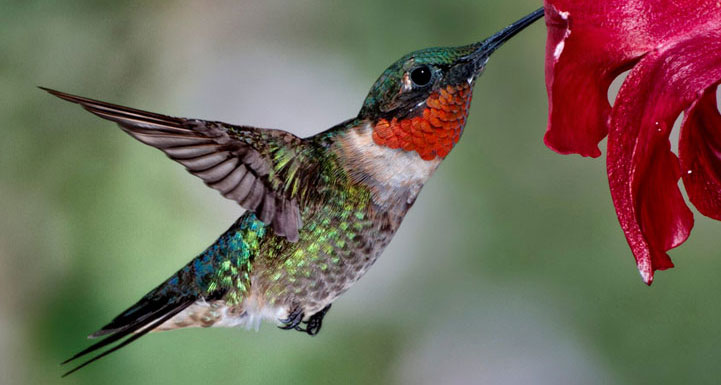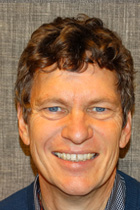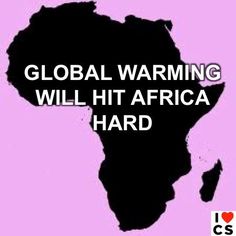2019: The year of decentring the human in African Studies?


Harry Wels is an organizational anthropologist by training. His research is about organizational structures of cooperation in the context of nature conservation and relates to broader issues in animal studies. He has written this blog as the convenor of the Collaborative Research Group Trans-species perspectives on African Studies.
ASCL researcher Jon Abbink (2018) is absolutely adamant in the introduction to his latest book The environmental crunch in Africa: Growth narratives vs. Local realities: Climate change should dominate the Africanist research agenda! Jon’s call for African Studies is part of a growing refrain that is now sung, if not shouted, by many scientists from around the world and encompassing not only Africa, but the whole world.
Climate change denial 'a crime'
 The Intergovernmental Panel on Climate Change (IPCC) latest report from October 2018 is outright alarmist in tone, as is Bruno Latour in his latest book Down to earth. Politics in the new climatic regime (2018, Cambridge: Polity Press) in which he hypothesises ‘that we can understand nothing about the politics of the past 50 years if we do not put the question of climate change and its denial front and center’ (p. 2). ’Climate change denial’, according to Latour, is a ‘crime’ (p. 24) and there are harsh words for Donald Trump in this regard.
The Intergovernmental Panel on Climate Change (IPCC) latest report from October 2018 is outright alarmist in tone, as is Bruno Latour in his latest book Down to earth. Politics in the new climatic regime (2018, Cambridge: Polity Press) in which he hypothesises ‘that we can understand nothing about the politics of the past 50 years if we do not put the question of climate change and its denial front and center’ (p. 2). ’Climate change denial’, according to Latour, is a ‘crime’ (p. 24) and there are harsh words for Donald Trump in this regard.
 Africa will be hit hard
Africa will be hit hard
A World Bank Report from March 2018 warns that particularly East Africa will be hit incredibly hard by the consequences of climate change and predicts that by 2050 more than 10 million people will be ‘forced to move’. The Brookings Institution expects that ‘Africa will bear the brunt of climate change’. The United Nations Environment report on Responding to Climate Change opens with: ‘No continent will be struck as severely by the impacts of climate change as Africa’.
Radical decentring of the human
Most, if not all, predictions on the consequences of climate change on the African continent focus foremost on humans. But the threat of climate change is not only about us humans, or maybe not even primarily about us: It is about a whole web of life that holds our planet together, according to James Lovelock in Gaia. A new look at life on earth (1979, Oxford: Oxford University Press). Humans will not survive on their own, nor can they live on this planet just on their own; the ‘web of life’ survives together or not at all. Therefore bringing climate change to the top of our attention and research agenda requires a radical decentring of the human.
Popular protests
Sounds like a worthwhile idea? In the current geopolitical configuration it seems quite difficult to not think about human interests first, as we have seen again at the recent COP 24 in Katowice, Poland. It was first and foremost about people and their (national) interests at risk due to climate change. The recent Gillet Jaune protests in France are another example where human interests were considered paramount over planetary and climate change issues: President Macron wanted to tax fuel to discourage the use of cars and reduce CO2 emissions, but had to ‘retreat’ because of the popular protests against it, focusing on humans only.
 Leave our pedestal
Leave our pedestal
This general tendency to put people first also haunts African Studies and History, as Gewald et al argue in their latest book on nature conservation in southern Africa. At the beginning of 2019, may we, from the Collaborative Research Group Trans-species perspectives on African Studies, wish you all an inspiring 2019, in which we as humans will leave our pedestal as the centre of the world and the universe and will deal with climate change in Africa and elsewhere as our top priority in whatever we do, both in our personal as well as our professional capacities, as part of our living planet instead of as its master … even if you feel like a hummingbird fighting a huge forest fire!
This post has been written for the ASCL Africanist Blog. Would you like to stay updated on new blog posts? Subscribe here! Would you like to comment? Please do! The ASCL reserves the right to edit, shorten or reject submitted comments.
Top photo: https://www.brucecompany.com/hummingbirds-are-coming/
Right photo: https://thecontrail.com/photo/i-m-not-a-big-believer-in-global-warming?commentId=4744723%3AComment%3A792161&xg_source=activity
Upper left photo: https://nl.pinterest.com/noclimatechange/effects/
Lower left photo: https://innerself.com/content/personal/relationships/8957-falling-off-the-pedestal.html


Comments
In this post, Harry Wels calls for seeing ourselves as part of our living planet instead of as its master. A good thought - but by no means a new one. He is also correct in making the link with climate change – but again, there is nothing new in that. What is new is that he links this with a call for a ‘radical decentring of the human’ specifically in African studies. This is the agenda of one of ASCL’s new Collaborative Research Groups, which holds that ‘humans and animals only differ in degree and not in kind’. Of course, this stops short of saying that Africans and animals are of the same kind – but still, this is precisely where the problem lies.
African authors like Achille Mbembe have convincingly pointed to the dark side of studies on and about Africa, in which Africans have been ‘otherized’ and indeed dehumanized. This dark side is still too close for comfort – tendencies in African studies to otherize the African have by no means been overcome. In a way, the global North was able to get away with this type of reasoning for a long time, because Africa depended on Europe but not vice versa. The global North could get away with ignoring Africa. In the words of Walter Rodney (1972:246) ‘Africans were no more makers of history than were beetles – objects to be looked at under a microscope and examined for unusual features’. Climate change has changed all that: in a way, it is the great unifier of the human race. If we want to combat climate change it is no longer possible to ignore the needs and aspirations of hundreds of millions of Chinese, Indians, and indeed, of Africans. Climate change does not call for a ‘radical decentring of the human’ – rather the opposite: it calls for a long overdue radical affirmation of our common humanity.
Climate change is also a strong argument in favour of adopting a broader approach, looking at ecosystems, not only at humans. But that is not the same as what Wels means with ‘decentring the human’. Nevertheless, one could argue that there are other reasons for building a research agenda around this idea. However, I would argue that in that case, it should be approached differently. To borrow a phrase from anthropology: the ASCL should know its ‘place’.
The African Studies Centre Leiden is part of the Dutch knowledge production system. It is funded by Dutch taxpayer money. Its resources are limited – so choices to establish CRGs, to publish books or to organize other activities do not purely emanate from free-floating intellectual insights. There has to be a strategy behind it. That strategy has to be conscious of the position of Dutch knowledge in all of this – and that is where there is a world to be gained.
It is clear that in Europe, spearheaded by the Netherlands, a unique system of shaping the relationships between humans and animals has been built up. This has made Dutch animal husbandry the most productive in the world – but also the most polluting of the environment and arguably the largest producer of animal suffering. It is built on dehumanizing farmwork and objectifying animals. Dutch agricultural knowledge has been actively promoted and exported to Africa and this is continuing today. Critical reflection on the role of Europeans in this area and in what has to change, first in Europe but also in the rest of the world would be an entirely legitimate area for research for the ASCL. Africans are of course free to think about their relationship with animals – but us Dutch should start in our own backyard.
Dear Bert,
Thank you for your comment on the blog of the CRG 'Trans-species perspectives on African Studies', much appreciated!
In response to your comment: Maybe it is all a matter of definition, discourse and semantics, but if you write about a 'radical affirmation of our common humanity', does the 'common' then also include non-human sentient beings? Because if not, then it is precisely the point I want to make in the blog. If it does include other sentient beings, then we might not disagree as much as you seem to suggest in your comment?
Dear Harry,
Thank you for that friendly reply! You may have a point - we probably do not disagree as much as it seems at first sight - but we probably do disagree a bit more than what you are hoping for.
On the philosophical level, I admit that an approach that tries to be just to all 'sentient beings' seems more inclusive than an approach that only considers that humans or only certain humans are sentient. So at the philosophical level, I cannot and do not accuse you of playing into the hands of the dehumanizers. In practice though, I am a bit concerned about how this approach might work out, given the sad history of studies on Africa.
Are there non-human sentient beings? For me, the jury is still out. I am not ready to take that step. But perhaps more relevant: would it make a difference? What would I do differently if I admitted that there are non-human sentient beings (on Earth)? Where is the surplus? More to the point: what is the surplus for African Studies and why should African studies (in Leiden) want/need to take the lead in this? What is the political and strategic relevance or opportunity here?
Politics is about choices: there is more than enough injustice in the world and no matter how inclusive we want to be, conflicts of interest will remain. Taking an ecological justice point of view would be my starting point...
Dear Bert,
Thank you for your new comment, especially because it touches on basic assumptions that we maybe not share completely and that may explain our differences.
Allow me to respond especially to the second half of your comment, starting from ‘Are there non-human sentient beings?’ till the end of your comment 'would be my starting point ...'.
If we allow weight to scientific evidence and ‘proof’, your opening question is already answered by the scientific community in the affirmative, ‘yes, there is no longer any scientific doubt that there is non-human sentience’ and scientists have declared that officially and publicly, see: http://fcmconference.org/img/CambridgeDeclarationOnConsciousness.pdf.
You ask, what you/we would do differently if you/we ‘admitted’ (an interesting choice of word in itself in relation to going about overwhelming scientific evidence that sentience is not exclusively human, see Cambridge Declaration above) that there are non-human sentient beings? My answer would be that maybe we would stop killing non-human sentience so easily and routinely for our own human interests and pleasure, ranging from food (i.e. meat and dairy) to medicine and biology (i.e. laboratory animals and vivisection) to nature conservation (i.e. hunting and culling, see the introduction to Gewald et al's recent book (2018) in the African Dynamics Series).
Finally you write ‘Politics is about choices’ and I certainly agree with you there. But democratic politics is also about ‘representation of’, ‘giving voice to’ and protecting the vulnerable and less-powerful in society. If we want to live up to that idea of political choices, non-human sentient beings should be definitely part of it.